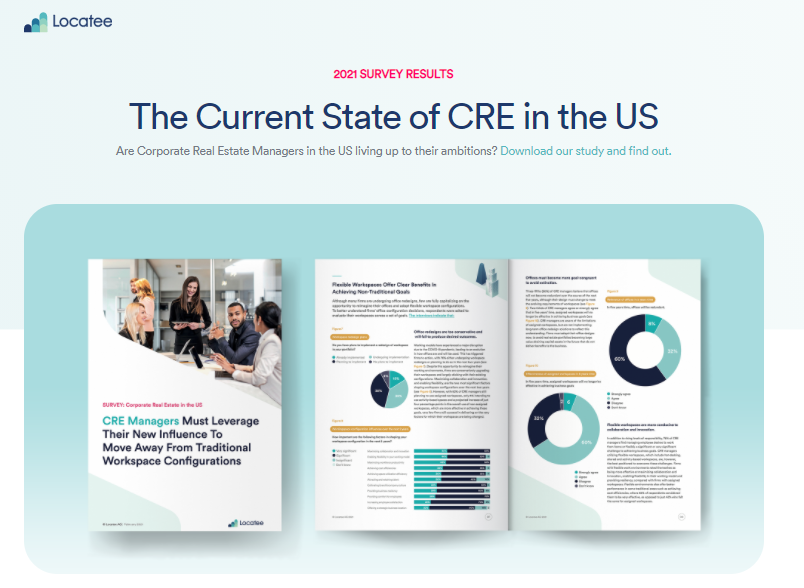
New research conducted by Locatee , the workspace occupancy and analytics provider, shows that organizations are not adapting corporate workspaces to match the demands of post-Covid workforce. The research interviewed corporate real estate managers (CREMs) across the U.S, about the changes they have seen in the last 12 months and how the businesses they work for are preparing for the future.
Outdated real estate strategies are holding back innovation post-Covid
Despite the opportunity to reimagine their working environments as a result of the pandemic, firms are conservatively upgrading their workspaces, and largely sticking with their existing configurations.
Prior to COVID-19, two-thirds of firms were utilizing assigned desk set-ups, either in the form of cubicles or open plan/office spaces, with only 16% of firms employing co-working or shared spaces. In the next two years, this trend is largely set to continue, with CREMs indicating very little movement towards more progressive hot desking, co-working or activity-based configurations.
CREMs have gained strategic influence, but lack ability make the necessary changes
Corporate real estate managers have long been viewed as a support function within large organizations. However, in the last year their level of involvement and strategic influence has grown markedly. Two-fifths of CREMs believe their new level of strategic influence will remain, with a further 58% expecting it to increase in the next five years.
Despite greater involvement at various levels, only 46% of CREMs have final budgetary sign-off. CREMs still lack the decision-making authority to match their level of responsibility, and 62% of those interviewed stated that lack of stakeholder buy-in was a significant or very significant challenge, making it hard for them to convert their knowledge into tangible actions.
This lack of budgetary control, despite elevated strategic influence, means CREMs face a significant barrier when implementing ground-breaking action around real estate strategies. When asked about the level of priority executives attribute to a range of business goals in 2020, more traditional efficiency-centric initiatives such as cost management, space optimization and productivity were highlighted as the top priorities for two-thirds of CREMs.
This focus on business efficiency, both in the short and long term, is at the expense of emerging initiatives such as collaboration, employee satisfaction, digitization and talent attraction and retention.
CREMs must drive a recalibration of business objectives
60% of CREMs believe that physical offices will remain the focal point for most organizations over the course of the next five years, although they recognize that their design must change to meet the evolving requirements of workspaces.
Two-thirds of CREMs agree or strongly agree that in five years’ time, assigned workspaces will no longer be effective in achieving business goals. Over the next five years, 88% of CRE managers believe that space efficiency will be more about employee comfort and satisfaction than density.
Thomas Kessler, CEO and co-founder at Locatee said, “It’s clear that organizations remain too focused on short-term activities – despite an admission by CREMs that the large majority of businesses need to review the purpose of the workspace and adapt to the new way of working post-Covid. As we return to workplaces, assigned spaces will no longer be effective, and employee wellbeing will become the most important metric. To meet this demand CREMs must lead the way in adapting the workspace to bolster employee satisfaction and productivity.”
Despite the realization that change is needed, these business initiatives are not being prioritized accordingly. With their increasing influence, CREMs are the individuals best positioned to make budgetary decisions around workspace and real estate. Organizations must provide CREMs with the opportunity and authority to implement the long-term vision needed to change offices for the better.
Locatee, which currently works with organizations such as Deloitte and SwissRe, recently opened a new office in New York to help organizations better optimize millions of square meters of unused corporate real estate.
The full report can be found here: https://crem.locatee.com/survey-cre-in-the-us
